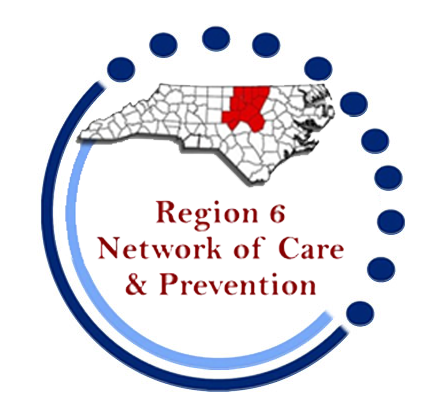
Part B of the Ryan White HIV/AIDS Treatment Extension Act of 2009 (Public Law 111-87) provides grants to States and Territories to improve the quality, availability, and organization of HIV health care and support services. Within the RWHAP Part B grant there is: a base grant for core medical and support services; the AIDS Drug Assistance Program (ADAP) award; the ADAP Supplemental award; the Part B Supplemental award for recipients with demonstrated need; Minority AIDS (MAI) Initiative funding for education and outreach to improve minority access to medication assistance programs, including ADAP; and supplemental grants to States with “emerging communities.”
Part B dollars are awarded to the state and then distributed to regions within North Carolina. Wake County Human Services receives the award dollars for Region 6. This agency then distributes the funding to other agencies and providers within the region to serve individuals in Chatham, Durham, Franklin, Granville, Johnston, Lee, Orange, Person, Vance, Wake and Warren Counties.
Part B funds core medical services and support services. Region 6 allocates funding to specific service areas based on State/Territory decisions and needs assessment and available funding. Region 6’s core medical services include outpatient and ambulatory health services, health insurance premium and cost-sharing assistance, emergency financial assistance, oral health care, pharmacy assistance, medical transportation assistance, and specialty medical care. In addition, Part B funds agencies to provide mental health services, outpatient substance abuse care, food pantries, nutritional counseling, and medical and non-medical case management, including treatment-adherence services. Part B support services must be linked to medical outcomes.
Note: Some of this information comes directly from Health Resources and Services Administration
The Housing Opportunities for Persons with AIDS (HOPWA) provides housing assistance and supportive services for those with HIV/AIDS and their families who meet certain eligibility requirements. HOPWA enables eligible persons with HIV/AIDS and their families to secure decent safe and sanitary housing in the private rental market by subsidizing a portion of the household’s monthly rent.
Region 6 has three administrators for HOPWA services: Duke Partners in Caring, The City of Durham, and Wake County Human Services:
The Partners In Caring HOPWA program at Duke provides services for the counties of Granville, Lee, Vance and Warren. HOPWA services in this area include Short-term Mortgage, Rent and Utilities (STRMU), Tenant-based Rental Assistance (TBRA), Resource Identification, and Supportive Services (i.e., housing case management).
The City of Durham HOPWA program provides services for the counties of Durham, Chatham, Orange and Person. HOPWA services in this area include STRMU, TBRA, Resource Identification, Supportive Services (i.e., housing case management) and Permanent Housing Placement (PHP).
The Wake County Human Services HOPWA program provides services for the counties of Wake, Franklin, and Johnston. HOPWA services in this area include STRMU, TBRA, Resource Identification, and Supportive Services (i.e., housing case management).
The Housing Opportunities for Persons with AIDS (HOPWA) provides housing assistance and supportive services for low-income person with HIV/AIDS and their families who meet certain eligibility requirements. HOPWA enables eligible persons with HIV/AIDS and their families to secure decent safe and sanitary housing in the private rental market by subsidizing a portion of the household’s monthly rent.
HOPWA case managers are able to assist with Short-Term Mortgage, Rent, and Utilities (STRMU), Tenant-based Rental Assistance (TBRA), Resource Identification, and Supportive Services (i.e. housing case management).
To contact a local HOPWA agency by county, please see below:
Granville, Lee, Vance, and Warren Counties
Duke Partner’s in Caring
Phone: 910-795-1960 Ext: 111
Fax: 910-795-1961
Address: 315 Trent Drive
Durham, NC 27710
Durham, Chatham, Orange and Person Counties
City of Durham HOPWA Program
Contessa Sawyer
Email: csawyer@dconc.gov
Phone: (919) 560-8362
Fax: (919) 328-6108
Franklin, Johnston, and Wake Counties
Wake County HOPWA Program
Office Phone: 919-212-7801
Wake County Housing and Resource and Referral Line
Phone: 919-861-1195
Website: https://endhomelessnesswake.org/continuum-of-care/coordinated-entry/
To learn more about HOPWA services, please visit the national website at https://www.hudexchange.info/programs/hopwa/
Prevention Services
The Region 6 Network of Care and Prevention offers four prevention programs to clients in our area that provide education, testing and linkages to Pre-Exposure Prophylaxis (PrEP) and STI treatment. These programs are funded through the State and implemented by: Alliance AIDS Services-Carolina, Durham County Department of Public Health, Healing with CAARE, Inc., North Carolina Central University, and Wake County Human Services. Below are descriptions of each of the programs, as well as information on how to request services.
Request Prevention Services
To request prevention services or to receive more information about the programs listed below, please contact the Regional Prevention Coordinator:
Hailey Stout
(919) 212-8391
Hailey.stout@wakegov.com
PrEP Program
PrEP stands for pre-exposure prophylaxis and is a once a day tablet a person can take to reduce their chances of becoming HIV positive by more than 99% from sex (CDC). The PrEP program’s mission is to increase PrEP usage by high risk HIV negative people to make sure they stay HIV negative.
There are two primary goals of the program:
- Make PrEP accessible to those who need it.
- Ensure there are ample trained medical providers to offer PrEP services
The program has a Coordination and Peer Navigator, both who work at Wake County Human Services and provide regional support. The Peer Navigator provides PrEP education, counseling, and linkage to care. The Peer Navigator also assists clients with overcoming barriers such as lack of insurance or transportation and the costs of PrEP prescriptions. Clients enrolled in the PrEP program are eligible for incentives. To learn more about this program, click here.
Community Testing
The community testing project is designed to provide HIV/STD testing services to high risk HIV negative people such as men who have sex with men of all races and ethnicities, women, people who inject drugs, commercial sex workers, transgender persons, people living with HIV/AIDS that are unaware of their status, and other at-risk priority groups. Testing is offered in public parks, on street corners, and at other community settings or at fixed testing sites including homeless shelters, jails, drug treatment centers, migrant health centers, mental health facilities, nightclubs and colleges. Testing is offered at hours and locations that are accessible to persons at highest risk for HIV. This project integrates social media into testing activities to help spread key messages and increase awareness and access to testing services by key priority groups. Social media helps to reach people when, where, and how they want to receive health messages. Projects integrate social media into health campaigns to utilize trends and expand health messages on websites, downloadable applications, SMS text messaging, Facebook, YouTube, Twitter and/or other social media tools to disseminate health messages. To find out where to get tested, click here.
